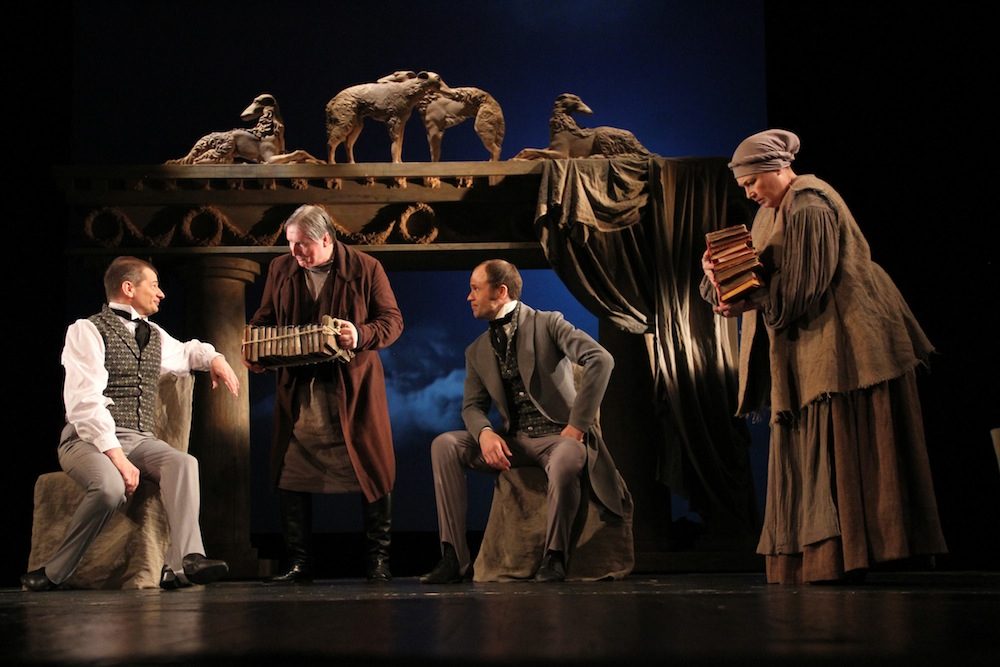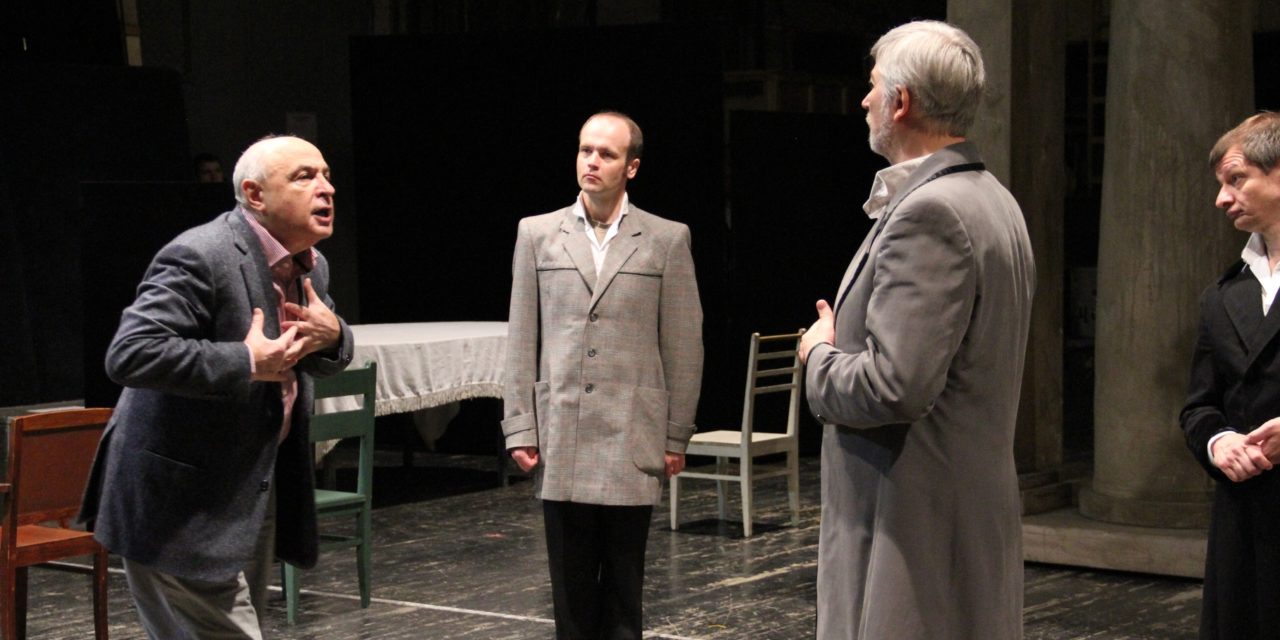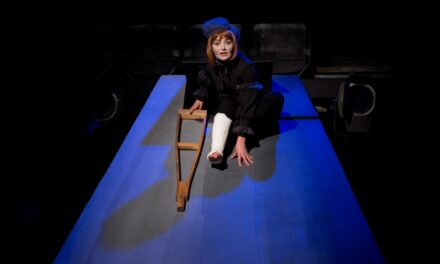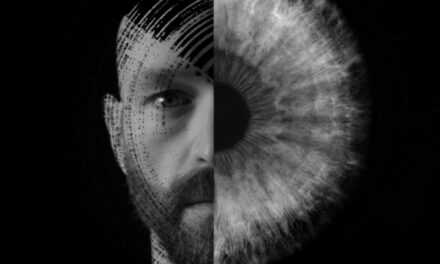Kiev’s National Theatre of Russian Drama brings a festival of events celebrating Ukrainian culture, Ukrainian Culture Today, to the St. James Theatre from 8 to 19 September 2015, curated by Mikhail Reznikovich, an artistic director of the National Theatre of Kiev. We met with Mikhail to talk about the upcoming London tour, why Russian classics are still relevant for the contemporary audience and to find out about the theatre’s future plans.
Anna Prosvetova: Mikhail, it is nice to meet you! Thank you for bringing Russian classical drama to London. Your theatre frequently goes on tours to other countries, but this will be your first London tour. Could you tell us how did this project come about?
Mikhail Reznikovich: Yes, we are traveling quite a lot with our theatre; we went to Germany, Austria, Poland, Turkey, Israel and to China. London is one of the major theatre capitals in the world, and we always wanted to perform here, to feel the nerve-strain and emotions of the London audience. Our intentions were supported by the invitation from the St. James Theatre that we gladly accepted, though it is a very serious project for us: we are bringing a team of 90 people to London.
AP: Mikhail, could you tell us about the plays you are going to present to the British audience and what influenced your selection. Are you bringing any new performances or old ones, restored specifically for this tour?
MR: No, we did not restore any plays for this tour. In London, we are going to perform four plays, two of which are Chekhov’s works. The first is My Mocking Happiness and it is based on the 25 years-long correspondence between Anton Chekhov, Olga Knipper-Chekhova, and Lika Mizinova. Today we are the only theatre staging this play on the post-Soviet territory. Initially, we have staged it simultaneously with the Vakhtangov theatre in 1966. However, their show with Yuri Yakovlev was on stage for four years only, while in our theatre it is still going on and attracts constant interest. I have read Chekhov’s letters when I was 28 years old, and they became a distinctive moral landmark for me. This play is filled with the author’s thoughts about life, art, relationships between men and women. The audience still welcomes this amazing play with enthusiasm and warmth. The leading role is performed by Vyacheslav Ezepov, an actor of the Maly Theatre in Moscow. He appeared as Chekhov for the first time on the day of the play’s premiere, almost 50 years ago, and still travels to Kiev every month to lead the show.
Our second Chekhov’s play is called Life’s Little Nothings. It has been created as a compilation of Chekhov’s short stories, which are very different in nature – from humorous to tragic. This show grew from individual works by our actors, which we later combined in one show with Kirill Kashlikov, an actor, and director. Our audience adores this play for its humorous and at the same time dramatic nature, accompanied by Chekhov’s wise quotes. For instance, he says that «in their development actors today are seventy years behind the Russian society.
We are also bringing Ward of the Manor by Ivan Turgenev, the opening play of our London tour. We staged it in Ukraine for the first time and it is one of my favorite plays by Turgenev. I directed his works in Novosibirsk and at the Tovstonogov Bolshoi Drama Theatre in St. Petersburg. Written by 30-years old Turgenev in 1848, this play differs from the author’s usual romantic, I would say “pastel” works that we all know very well. Ward of the Manor is almost a tragic farce, a play about how acutely rich people could bully the poor ones. I think this play is very relevant even today, and it was performed in the English language at the Old Vic theatre in 2013. In Kiev, this show is a great success and we are happy to present it to the London public in the original language.
Our forth play is an absolute novelty for London, and we are extremely happy to introduce it. It is Don Juan, a play by a renowned Ukrainian poet Lesya Ukrainka. Ivan Franko, a major Ukrainian writer, once called Lesya the only real man in the Ukrainian literature. She finished it in 1912, just a year before she passed away. The text is yet another legend about Don Juan, after Molière and Pushkin, but I believe it touches on more social issues and very close to a contemporary spectator. This play talks not only about a love conflict between a man and a woman, between Don Juan and Donna Anna, but also about the problem of choice of one’s life path. While Don Juan’s life motto is “The one is free in this world only if the society rejected him,” Donna Anna believes that “There is no freedom without authority.” It is a clash of these two approaches, which in Lesya Ukrainka’s work results in the woman’s victory. Apart from this collision, this play presents an original image of Dolores, a young girl, who selflessly loves Don Juan without any hope of being loved back. This image of Dolores is in many aspects a reflection of Lesya’s personal life. Out theatre has been successfully performing this show for more than 12 years already, and I hope the work of this playwright will become a real discovery for London.
AP: British directors and playwrights constantly return to works written by Russian authors, including Chekov and Turgenev. What is the reason for this interest?
MR: I think in terms of the world theatre scene, Chekhov is the major figure of the 20th century. Similar to Isaac Newton, who discovered objective laws in science, Chekhov revealed for us the laws of a twentieth-century human soul, when the internal life is much richer, more intense and paradoxical than its external manifestation; when humor conceals pain, and irony conceals despair. To disguise the tragedy of his own life, to forget about his worries, one starts laughing at himself. Chekhov saw it, felt it and expressed it in his writing. In other words, Chekhov presented us to ourselves. He is our mirror, and we just need to learn how to look into it, which is frequently a difficult task. All this is very vividly expressed in his letters and diaries, and it is one of the main reasons I like My Mocking Happiness play.
The paradoxicality in thinking and behaving is one of the main weapons of Chekhov. However, his works contain yet another great thing – defencelessness of a contemporary individual in the face of horrors of life, which he masks with a great level of fortitude. There is a beautiful phrase by Chekhov: “People are drinking tea, while their hearts are breaking.” The author examines our behavior in some very concrete, critical situations, trying to reveal the real motives of this behavior. By the way, Bernard Shaw’s play Heartbreak House is the author’s fantasy based on Chekhov’s ideas and explorations.
As for Turgenev, I think for me the most appealing aspect of his work is an enormous desire to reach the harmony, rooted in all his characters. I believe that Turgenev is one of the most harmonious Russian writers. Somewhere deep inside we all striving to find this harmony, not only in our private but also in social life. This desire is enormous, but how could we fulfill it? Turgenev’s characters are a unique example of self-sacrifice and unselfishness. Think, for example, about so-called Turgenev’s girls, Rudin or Lavretsky. Turgenev was the first who presented Europe not only with the generosity and grandeur of the Russian soul but also introduced the Western audience to the works by Alexander Pushkin and other great authors of Russian literature of the period.
AP: I know that the theatre performances are only a part of a bigger project. Could you tell us more about other events and the project in general?
MR: Yes, our tour is a part of a wider project, called Ukrainian Culture Today, and includes free screenings of two remarkable Ukrainian movies: Shadows of Forgotten Ancestors by Sergei Paradzhanov and Earth by Alexander Dovzhenko, one of the top ten major movies in the cinema history. By the way, the role of Olga Knipper-Chekhova in My Mocking Happiness is performed by Larisa Kadochnikova, a wonderful actress, who also starred in Shadows of Forgotten Ancestors. During the festival, the screening of this movie will be followed by a meeting with the actress.
We are also bringing a photo exhibition called Ukrainian Culture Today that will be open during the festival.

Courtesy of Kiev’s National Theatre of Russian Drama.
AP: Classical works represent the major part of the repertoire of your theatre. Are you interested in directing works by any young writers?
MR: Just recently our theatre presented Little Soldiers, a play by Vladimir Zherebtsov, a young Russian author. It was a very interesting show, and we even received an invitation to bring it to the Vince-Baden contemporary theatre festival. However, in general, I think that contemporary drama is in the state of respite and that is why we are looking back at classical works. At the same time, we are showing a play about Alexander Vertinsky, Edith Piaf; very recently we have launched a play about Klavdiya Shulzhenko, a famous Soviet singer. Every evening our actors are working on three parallel stages, and while the main stage is given to classical performances, the smaller stages are dedicated to experimental works.
AP: Mikhail, what could influence your decision to stage a certain play?
MR: I think the play, first of all, should be consonant with the today’s reality. My main inspiration in work is the necessity to solve the inner life of a person, his psychology with all its curves, paradoxes, unexpected actions and secret life. I believe that this intention moves forward myself and the actors of our theatre. It is also a perfect reflection of Georgy Tovstonogov’s legacy, who was my mentor and teacher. The form of the show, stage design and the rhythm of the performance are undoubtedly very important, but the main thing for me in this process is the human being.
Twice in my career, I directed shows based on Fyodor Dostoevsky’s works: The Adolescent in Moscow and then The Gambler in Kiev. And Dostoevsky once said: “A human is an enigma. It should be unraveled. I am unraveling this enigma, and thus remain a human being.” This quote is my main maxim in the process of choosing a new play. Every person is a hurricane of passions, secret desires, and instincts. They are frequently veiled with our words, but their deciphering and realization in the three-dimensional space of the stage is the most intriguing mission.
AP: Mikhail, you have started your education in the physics department, but later decided to become a theatre director. Why did you change your idea and do you use your technical knowledge in the creative career?
MR: It was a different time. I lived in Lvov and became a theatre enthusiast in my early school years. However, my parents wanted me to obtain a more realistic profession and I started my education in the physics department. Nevertheless, my technical education was not a long one, and after its third year, I collected my documents and secretly from my parents escaped to Leningrad, where I entered a directing course of Georgy Tovstonogov.
I am still using skills and knowledge I gained during these three years at the physics faculty studying different subjects, such as higher mathematics and theoretical mechanics. They systemize your thinking, help you to organize yourself and, speaking in theatre language, provoke your action.
AP: What do you think about contemporary theatre? Why are people still interested in theatre today, in the time of digital technologies, television, and cinema?
MR: For our tour, we tried to choose shows, where classical subjects resonate with our own questions, questions of people from the twenty-first century. We would like to present plays, where through traditional conflicts and situations we would discover something new about us or about each other, about our problems and conflicts. I think plays by Chekhov and Turgenev meet these requirements perfectly and, therefore, still hold the attention of audiences from different cultures and backgrounds. This aspect is very important for us, but the reaction of spectators could be very different. For instance, one of the final scenes in My Mocking Happinesstunes into the conflict in Donbas, the southeast of Ukraine. This scene is about Anton Chekhov’s testimony, where he addresses his sister and the whole family, saying: ‘Support poor people, protect your mother, live peacefully. Anton Chekhov.’ During the last year, at every show, when the actor performing Chekhov’s role says: ‘Live peacefully’, the audience explodes with thunderous applause. It is a distinctive response to our reality we live in today.
AP: Mikhail, could you tell our readers about your new shows? What could they expect in 2015-2016 Season in your theatre?
MR: All new shows are corresponding with what is important for us at the moment. I very much appreciate plays by Aleksei Arbuzov, a Soviet playwright, who was very popular in the UK some time ago. There was a moment when all three stages of the National Theatre in London presented his plays at the same time: Evening Light, Old-fashioned Comedy and My Poor Marat. I knew the author personally and directed several shows based on his works. Now we are working on his play called Cottage on the Outskirts. It is a play about love, there are no social conflicts or negative characters. However, love and everything related to it is always an internal conflict. Therefore, it is quite a difficult show and requires a great emotional involvement from artists.
At the same time together with the director Kirill Kashlikov we have started working on one of the greatest plays by Arthur Miller, A View from the Bridge. I believe that together with Death of a Salesman it is one of the deepest and most serious works by the author. It brings back the theme of human bondage, so different and so vivid. We are finishing our work on Ibsen’s Nora and have recently started working on Nude with Violin, a play by Sir Noël Coward, an English writer from the 1940s-1960s. This work, written in Oskar Wilde’s manner, is still topical, may be due to the fact that it questions the issue of pseudo-avant-gardism, which is relevant also today: when an artist tries to present as a masterpiece the work, done in a slapdash manner, without any moral investment.
Out theatre always has been one of the top ten theatres on the territory of the former Soviet Union, and still today we are striving to remain loyal to our profession, to the theatre of a human spirit. We are trying to search for, solve and realize in the three-dimensional space of the stage a personal story, because all true theatre – from Shakespeare to Ionesco – is most and foremost about a personal, human story. I believe that this intention is the main reason of the audience’s interest and the full house for every show in our theatre.
AP: Mikhail, thank you very much and good luck with your London tour!
Please click here to learn more about the Ukrainian Culture Today festival and book your tickets.
This article originally appeared on Russian Art + Culture on August 28, 2015 and has been reposted with permission.
This post was written by the author in their personal capacity.The opinions expressed in this article are the author’s own and do not reflect the view of The Theatre Times, their staff or collaborators.
This post was written by Anna Prosvetova.
The views expressed here belong to the author and do not necessarily reflect our views and opinions.


















